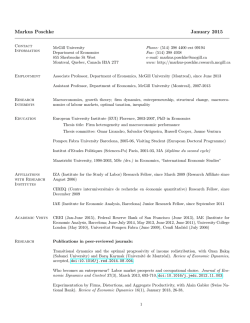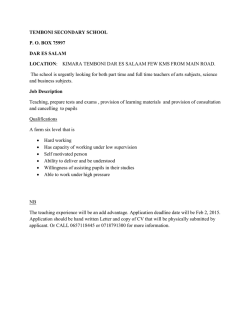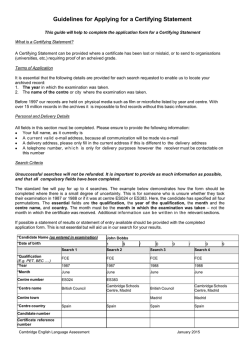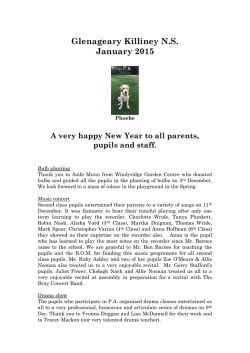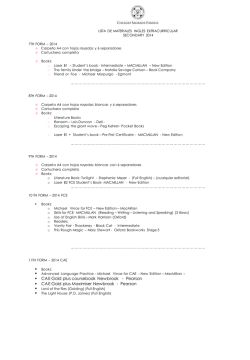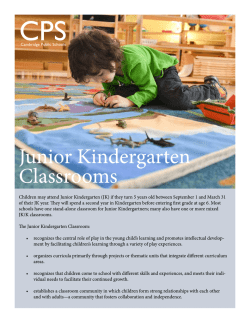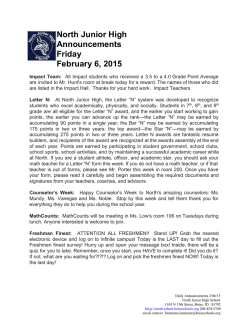
Senior EAL Policy
ROSSALL SCHOOL THE POLICY AND PROVISION FOR PUPILS FOR WHOM ENGLISH IS AN ADDITIONAL LANGUAGE Statement of Aims The school is committed to making appropriate provision of teaching and resources for pupils for whom English is an additional language. The school will identify individual pupils' needs at the earliest opportunity, recognise the skills they bring to the school and ensure equality of access to the whole curriculum. We aim to ensure that all EAL pupils are able to: • • • Use English confidently and competently Use English as a means to learning across the curriculum Where appropriate, make use of their knowledge of other languages The EAL Department – Senior School For students whose first language is not English, the EAL department provides courses to develop English language skills and communicative ability. Through structured course content students are assisted in improving the skills of reading and writing, speaking and listening as well as language development. The aims of the department are to enhance the students’ language proficiency and build confidence to help them achieve both academic and social success in an English-speaking environment. In 2011-2012 the department consists of 10 members of staff, providing EAL support in all year groups and all areas of the school. In the main school, Year 9 students with special language requirements receive one to one tutoring or teaching in very small groups, often outside the normal teaching timetable so that they can follow their other subjects as well. In Years 10 and 11 students follow the IGCSE First and Second Language syllabus and are prepared to take the public exams in the summer term of Year 11. Additional language support is also provided and many students will take the Cambridge PET and FCE exams. Typically students will receive 6 hours EAL per week. In the sixth form students attend general English courses with an aim to achieving the Cambridge FCE (B2), CAE (C1) or even CPE (C2) qualification during the lower sixth. In the Upper Sixth students follow an IELTS preparation course leading to the IELTS exam, an essential qualification in the students’ university application process. In both the Lower and Upper Sixth, students receive 3 or 4 hours EAL per week, depending on their ability. As far as possible, EAL lessons take place within the regular timetable. However, due to timetable constraints some lessons, especially extra examination preparation, take place during tutor periods, at lunch times or at the end of the school day. 27 academic - eal policy Assessment of Needs International students sit an entrance exam prior to acceptance into Rossall School. This consists of an English paper to assess their English language ability and suitability for academic study at Rossall. Only students who show evidence of sufficient communicative competence are selected for study in the Main School. Subsequently, upon arrival at Rossall School, the new students are retested to reassess their English language level and language needs. The placement tests are sat at the beginning of the autumn term during the students’ induction programme and consist of a computer based assessment giving a global score and written tasks to test writing skills and written communicative ability. The results of the assessments inform placement of the students into EAL classes. At Rossall we aim to group students according to ability. Once grouped, the students are assessed more informally in class during the first weeks of term and any amendments to settings can be made. Student needs are continually monitored with regular discussions on student progress within the department. Feedback from subject teachers, tutors and boarding staff is also requested to flag up any students who may be struggling and to inform EAL provision. In addition, students sit more formal, internal English examinations to monitor attainment. Combined with teacher assessment, these results highlight students capable of transferring to the GCSE programme in year 10 and those students more suited to following the EAL course and the IGCSE route. Teaching and Learning We aim to keep class sizes small and grouped according to ability to best meet the needs of our students. As a result we hope to encourage a relaxed and friendly learning environment where students can grow in confidence, where mistakes are accepted and viewed as an essential stage in language acquisition and where relationships can be built that allow students to feel comfortable expressing themselves in English and exploring the communicative possibilities of the language. EAL lessons aim to be engaging and interactive. Topics are chosen that aim to appeal to teens and a variety of activities are selected within a lesson to maintain pace and meet the needs of differing learning styles within the groups. Each year group follows a course book, which is supplemented with additional material. A typical lesson would comprise whole group discussions, pair work and individual work. Emphasis is on the phrasal nature of the English language, so in our approach to teaching EAL, students are encouraged to study natural phrases and collocations presented in context. We aim to teach language in context often using reading texts as a stimulus (newspaper texts, stories, magazine articles etc), which assists comprehension and communicates meaning more accurately. Students receive regular feedback on their attainment and performance either orally and through whole class error correction or individually through written comments. 27 academic - eal policy In addition to teaching English, we aim to enrich our students’ cultural experiences here in England and students have the opportunity to participate in many whole school excursions and sightseeing trips to Manchester, Liverpool and Chester as well as other places of interest. The International Study Centre (ISC) Statement of Aims The Rossall School International Study Centre is committed to making appropriate provision of teaching and resources for pupils for whom English is an additional language. The ISC will identify individual pupils' needs at the earliest opportunity, recognise the skills they bring to the school and ensure equality of access to the whole curriculum. We aim to ensure that all EAL pupils are able to: • • • Use English confidently and competently Use English as a means to learning across the curriculum Where appropriate, make use of their knowledge of other languages Year 11 Information First Language English A minority of our students (usually from Germany) also take the Cambridge IGCSE in First Language English in order to satisfy their local German education system requirements. Details of this course appear in the First Language English handbook. English as a Second Language In most cases, the main aim of ISC year 11 students is to achieve a B1 language qualification. To this end, students receive preparation for the Cambridge ESOL Exams (KET, PET, FCE and sometimes CAE). A further aim is for students to pass the Edexcel IGCSE English as a Second Language examination with a grade C or better, and preparation for this exam is therefore the main focus of the year 11 programme. In addition, we have taken into consideration: • • • • • • The length of the course The age of the students Class size Motivation Facilities Students’ cultural background Year 11 students are also following this course to learn English for academic purposes as they study other subjects in English and many are hoping to proceed onto sixth form studies at Rossall or elsewhere in the UK. They also need English for social reasons as they are living in the UK and require English for everyday survival. The secondary goals of this course are, therefore, to contribute to the intellectual, personal and vocational development of the learner. 27 academic - eal policy Students are expected to sit the Edexcel IGCSE English as a Second Language examination in the Summer term. A grade C pass in this examination is of a CEF Level B2 standard (equivalent to FCE or IELTS 6.0). The examination is very similar in design to the Cambridge FCE examinations so textbooks designed to prepare for these examinations have been chosen. The only section of the examination which is significantly different from the FCE standard is the summary writing. This is a task that students find particularly challenging and should be taught from the Autumn term. Teaching resources In Year 11, there are usually between six and eight classes of students. These range from 11A (usually starting in September with an upper-intermediate level of English) to 11H (usually beginners and false beginners). Due to this range of starting levels, there are schemes of work at different levels across the ability range so teachers can use the one most appropriate to their class. The main resources used are: • • • • English in Mind New Headway FCE Masterclass Red topic files Generally, each teacher will focus on using one of these key resources with their class, and is likely to have 2 – 4 hours a week with that class. The aim is that students in each group will have a maximum of two main teachers for their EAL classes. Because most of our students have a large number of English lessons, we use two wellrespected and well-structured core textbooks to ensure sound coverage of all skills areas, as well as developing stronger control and understanding of grammatical structures and vocabulary. The two course books chosen also include: • • • • • A seamless progression from beginner to upper-intermediate or advanced levels. Integrated skills work A choice of interesting texts with manageable, motivating tasks, ensuring the development of fluency and accuracy in all four skills. Useful Teachers’ books with extra resources and guidance on methodology, photocopiable tests and cultural notes Workbooks at each level offering a range of exercises and activities to consolidate and reinforce work covered in class. In addition to the core textbooks, teachers are encouraged to make use of a topic-based course by using a collection of red files compiled by ISC teachers. Each file is based on a different topic, and contains material from a wide range of resources from beginner to advanced levels. The topics have been identified as those most commonly occurring on the IGCSE ESL exam paper. Extra classes To help weaker students, there will be an opportunity after the mock exams for students to attend extra classes in listening, speaking, reading or writing. Students can also request or be recommended extra tuition at any time throughout the course. 27 academic - eal policy Year 10 / Junior Information Most Year 10 students are following this course to prepare for the demands of the one year IGCSE course. However, it is also our aim to provide challenge and academic motivation for International students wherever possible. To this end, students are constantly monitored and “taster days” can be arranged so that students can be given access to the wider syllabus offered by the traditional GCSE route. Typically, over the course of the academic year, several ISC Year 10 students will be transferred to Main School Year 9, where they spend more time with native English speakers and can start to consider their GCSE options for Year 10. The timetable for ISC Year 10 and Junior students is heavily loaded with EAL lessons as this is the number one priority for these students and they will typically have 12 hours of EAL per week, with as many as four different teachers. Because most of this large number of English lessons, two well-respected and well-structured core textbooks are used in order to ensure sound coverage of all skills areas, as well as developing stronger control and understanding of grammatical structures and vocabulary. Students in ISC Junior and Year 10 classes will also be prepared for Cambridge ESOL exams, typically achieving the PET by the end of their first year. The Junior School, including EYP At the Junior School a register of children for whom English is not their first or only spoken language is kept. Individual decisions about specific support for EAL issues are made in each case. Each child’s support plan is reflected on the register. It is unusual for the Junior School to have children who are not fluent in English regardless of other language abilities and backgrounds. In the case that a pupil is unable to access the curriculum comfortably in English a specific personal support plan will be made. The creation of such a plan will be supported by opinion and advice from the Head of EAL and EAL teachers at the senior school, Head of Junior School, class teachers, SENCO and parents. R:\Common Room\Policies\School\27. EAL Policy Date of Policy: September 2011 Author: Mungo Winkley Review Date: May 2015 SLT Lead: Deputy Head (Academic) 27 academic - eal policy
© Copyright 2026
